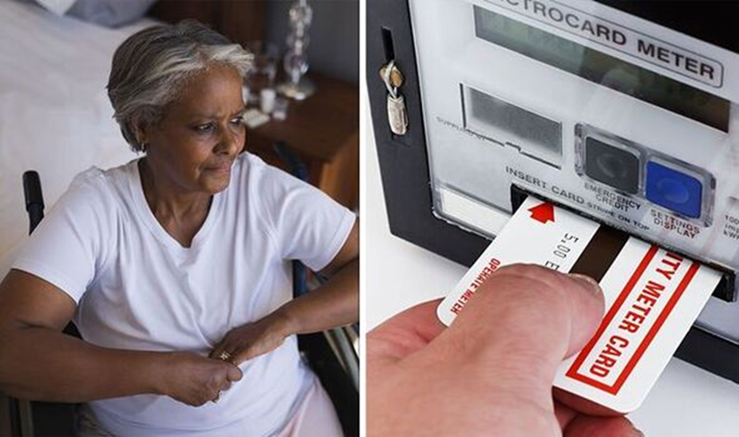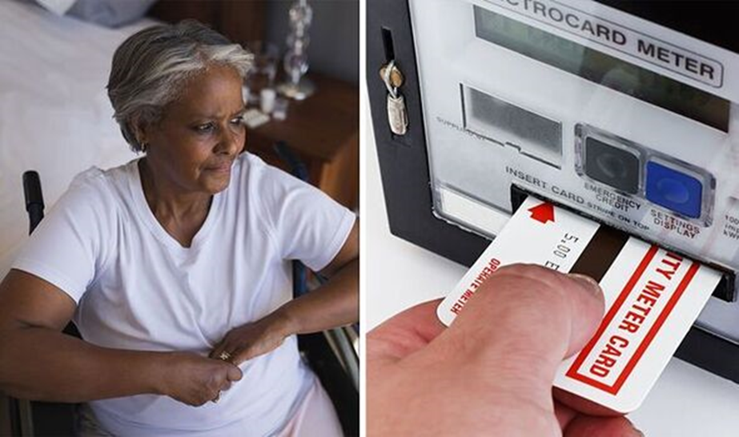Shared from Ruby Flanagan, Daily Express personal finance writer
Disabled woman felt ‘bullied’ by energy firm when asking for help to avoid prepayment plan

Ebere signed up to her provider through Priority Services (Image: GETTY) [Stock photo]
A disabled woman says her energy bills have “shot up” significantly due to her reliance on medical equipment.
Published 04:01, Sun, Nov 27, 2022 | UPDATED: 10:20, Sun, Nov 27, 2022
Ebere, whose name has been changed, has faced what she described as “bullying” from her energy supplier as they are trying to “force” an energy prepayment meter onto her. Ebere has multiple disabilities including paralysis and relies on a number of medical devices and equipment in her home to keep her mobile. This includes things such as an electric wheelchair, bed, hoist and blinds.
Ebere, who pays her energy bills quarterly and had signed up with her energy firm as a vulnerable customer through Priority Services, received the first warning that she could be placed on a prepayment meter earlier this year, however, when Ebere received her first Government cost of living payment, she used the money to pay off the entire debt.
She said: “I told them, I cannot have a prepayment meter, I’m disabled and I can’t move around well at all. I told them that I wouldn’t be able to reach the meter if they installed one, it wouldn’t work for me.”
Ebere also explained how energy was more expensive under a prepayment meter which meant she would be spending even more to simply run her equipment and her meter would likely run out a lot quicker due to this compared to someone else.
She added: “I said I couldn’t just go to the shop to buy more energy if I ran out, especially if it happened at night because my local shop closes at 10pm, I would just be sat in the dark until my support workers come but I can’t ask them to go out and top my energy, they come to help me, it’s not their job to do that.”
When she received her next energy bill, Ebere was unable to pay and called her provider again to ask about her options and whether they could give her a little more time to get the money together.
Ebere believed her request had been granted however continued to receive letters demanding payment.
Ebere said her experience calling the energy company was “devastating” as she felt she was met with little-to-no empathy, as in one of her many calls, she was recommended to switch off her medical equipment in order to bring the cost of the bill down.
She said: “I asked her again because I thought I’d misheard her and she did tell me to switch off my equipment and I did get angry. I asked her why she thinks she could tell me to switch it off, I am paralysed and I rely on this equipment.”
Ebere received another letter which stated the energy company had sent a representative round to her property and accused her of “purposely” not opening the door for them. She was then charged £31 for this visit.
She said: “I do not recall anyone coming to my house, if they did I must’ve been out. I did not hide and peep through the curtains. I was not there and they charged me for not being there. I honestly don’t know.”
Later a debt collection agency had been brought in and although Ebere felt this company had acted in a more “understandable and compassionate way” about her situation, however, they continued to push for payment.
Once Ebere received her £150 Disability Cost of Living payment, she sent the entirety of it to the energy company to try and prove to the energy company that she wanted to clear the debt but needed more time.
She said “I was so anxious, I was scared, I just didn’t know what to do. I felt alone and I told them everything I did not keep anything back because I thought they could help but they kept saying they would just put me on a prepayment meter. They didn’t listen to me.
“I felt devastated and how they acted was inhumane, I am a priority service and they just ignored it. The impact this has had on my mental health, sometimes I feel like there’s no need in living because I don’t know what I can do next.”
Ebere faced further demands from the debt collection agency and was eventually given one month to clear the payments due. Ebere then approached the community disabled women’s group WinVisible for help.
The case is still ongoing with her energy provider and on Ebere’s behalf, WinVisible has written to the energy provider and the debt collector asking them for more consideration and support and has approached the local MP to help.
Ebere is still hoping her energy provider can support her with the debts and not just push her onto a prepayment meter, however she said she is wary and believes this outcome is a bit of a far-fetched dream.
Ebere is not alone in her experience with her energy provider. This week Ofgem found failings across all 17 energy companies in their support for vulnerable customers.
The energy regulator said it had shared the ratings with all suppliers earlier this month and, since then, has started compliance engagement on the areas for improvement.
It also noted that it would also consider enforcement action where necessary on energy companies that were not showing improvements to their support services.
Financial coach Erik Porter believes forcing people onto prepayment meters can trap people in fuel poverty and that energy firms needed to do everything possible to help people if they are in difficulty.
He said: “I think the thing energy suppliers forget, is if I’m being chased for other debts then I could be getting 50 or so letters coming through my door, 26 emails, in some case texts and calls, and that can be intense to have the mental capacity to process all of this would be incredibly hard.”
Mr Porter doesn’t believe in an outright “ban” on prepayment meters as everyone manages their finances differently and some people find having a prepayment meter is “genuinely helpful” in being able to budget their spending.
However, Mr Porter added: “Energy companies are supposedly doing more recently to help their customers, but they can still do a hell of a lot more before pushing people onto prepayment meters.”
An Ofgem spokesperson said: “Through a number of market compliance reviews, we are looking more widely at how suppliers support vulnerable customers overall, such as those with disabilities, and that includes how people are treated when they are switched to pre-payment meters.
“The results of this will be published soon, with ratings for each supplier. We expect improvement plans to be delivered at speed and won’t hesitate to take punitive action where needed. Standards of service across the industry need to improve.”
WinVisible adds: We are asking the energy supplier for Ebere to get cash help from the company’s hardship fund, and for policy changes to end discriminatory treatment of disabled customers, including no forced pre-pay meters.


1 thought on “Disabled woman felt ‘bullied’ by energy firm”